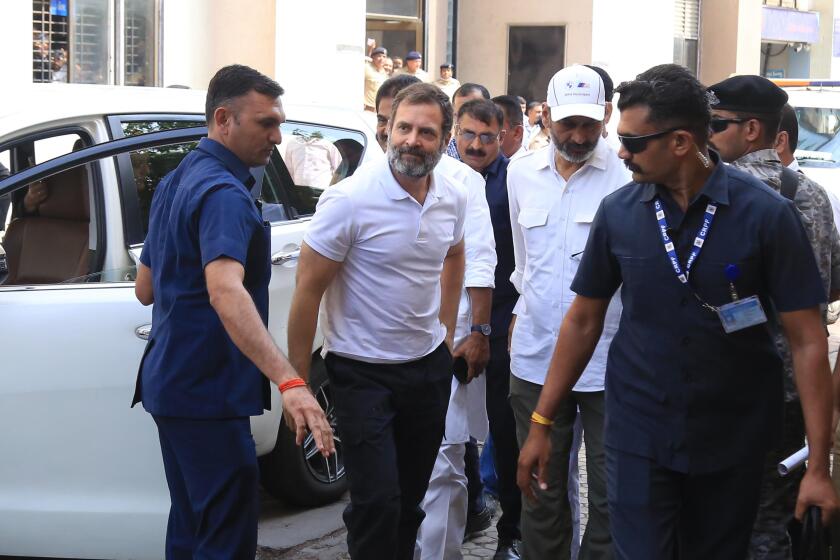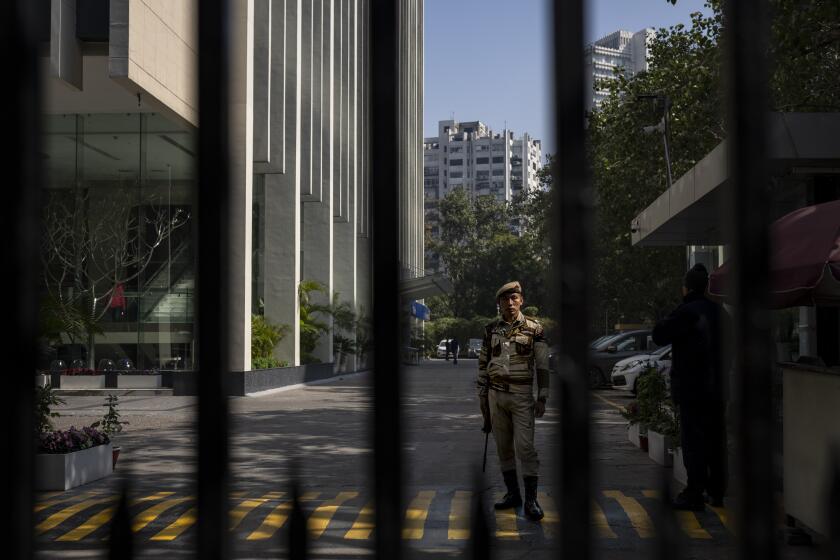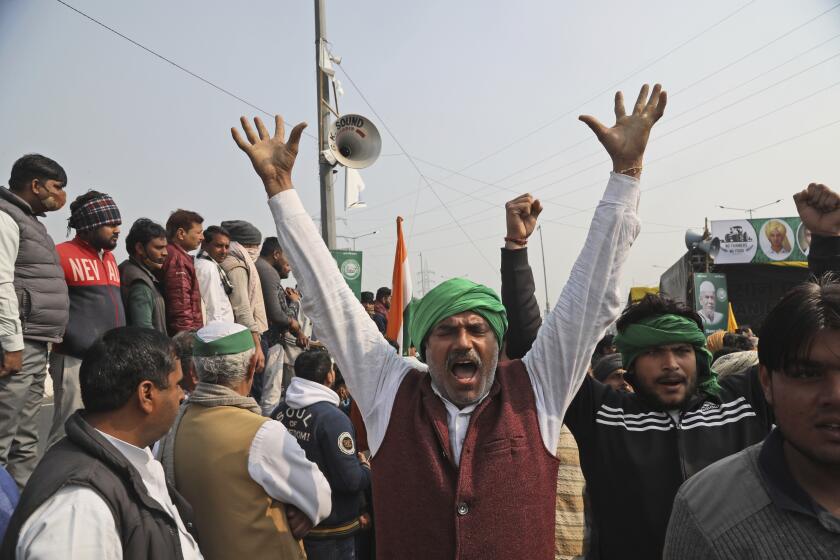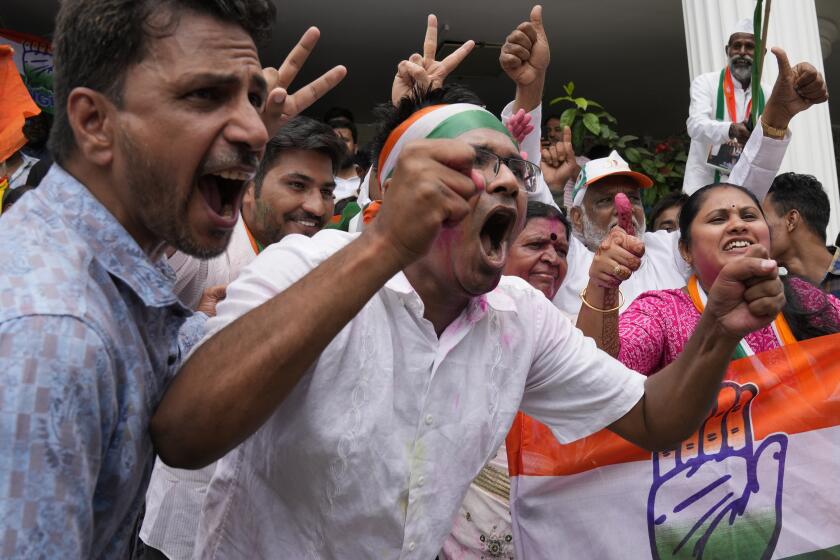India’s Modi gets a state visit with Biden, but the glitz is shadowed by human rights concerns
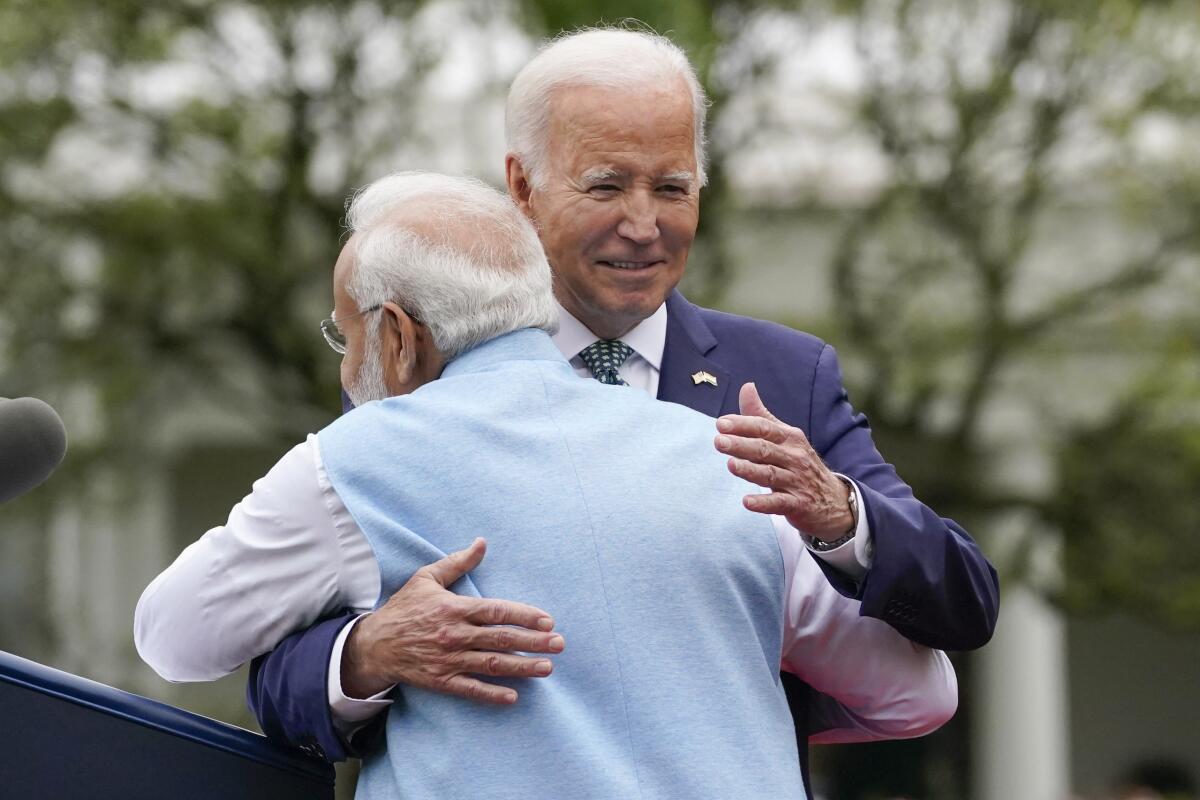
- Share via
WASHINGTON — President Biden emphasized the power of democracies on Thursday as he hosted Indian Prime Minister Narendra Modi at the White House, boasting of the collaborations between the two nations on “nearly every human endeavor” while stressing that universal human rights remain vital to the success of both the U.S. and India.
In a news conference Thursday, Biden called the relationship between the U.S. and India “among the most consequential in the world, that is stronger, closer and more dynamic than at any time in history.” He underscored how two of the world’s most powerful democracies were cooperating on issues such as the climate, healthcare and space, saying that the U.S.-India economic relationship was “booming.”
“On the issues that matter most that will define the future, our nations look to one another, including on critical regional and global issues,” Biden said in his opening remarks.
But standing alongside Modi, who has come under criticism from human rights advocates, Biden also emphasized that press, religious and other fundamental freedoms should be at the core of how both democracies operate. During their Oval Office meeting, Biden said, he and Modi had a “good discussion about democratic values” while Modi said “there’s absolutely no space for discrimination” when pressed about his own commitment on human rights.
“Democracy is our spirit,” Modi said through an interpreter. “Democracy runs in our veins. We live democracy and our ancestors have actually put words to this concept.” He said India has “proved that democracies can deliver and when I say deliver, this is regardless of class, creed, religion.”
The two leaders were devoting Modi’s state visit Thursday to launching new partnerships in defense, semiconductor manufacturing and more sectors as they look to strengthen their countries’ crucial — albeit complicated — relationship.
An Indian court has found opposition leader Rahul Gandhi guilty of defamation over his remarks about Prime Minister Narendra Modi’s surname.
Thousands gathered on the White House South Lawn for the welcome ceremony, listening to performances by violinist Vibha Janakiraman and the a cappella group Penn Masala. As Modi arrived, the crowd — including many members of the Indian diaspora — broke out in a chant of “Modi, Modi, Modi.”
“All eyes are on the two largest democracies in the world, India and America,” Modi said as the leaders met in the Oval Office. “I believe that our strategic partnership is important. I’m confident that working together will be successful.”
At the welcome ceremony, Biden said he believes the U.S.-India relationship “will be one of the defining relationships of the 21st century. Since I’ve become president, we’ve continued to build a relationship built on mutual trust, candor and respect.”
But as Biden fetes Modi, human rights advocates and some U.S. lawmakers are questioning the Democratic president’s decision to offer the high honor to a leader whose nine-year tenure over the world’s biggest democracy has seen a backslide in political, religious and press freedoms.
Administration officials say honoring Modi, the leader of the conservative Hindu nationalist Bharatiya Janata Party, is Diplomacy 101. The U.S.-India relationship will be vital in coming decades as both sides navigate an ascendant China and the challenges of climate change, artificial intelligence, supply chain resilience and other issues.
Indian tax officials launched a tax investigation into the BBC a few weeks after it aired a documentary critical of Prime Minister Narendra Modi.
Still, Biden said at the start of their meeting that he wanted the partnership to be “grounded on democracy, human rights, freedom and the rule of law.”
Among the announcements to be made Thursday is an agreement that will allow U.S.-based General Electric to partner with India-based Hindustan Aeronautics to produce jet engines for Indian aircraft in India and the sale of U.S.-made armed MQ-9B SeaGuardian drones, according to senior Biden administration officials. The officials briefed reporters on condition of anonymity to preview agreements before they are announced.
The Biden administration also is coming out with plans to bolster India’s semiconductor industry. U.S.-based Micron Technology has agreed to build a $2.75-billion semiconductor assembly and test facility in India, with Micron spending $800 million and India financing the rest. U.S.-based Applied Materials is announcing it will launch a
new semiconductor center for commercialization and innovation in India, and Lam Research, another semiconductor manufacturing equipment company, will start a training program for 60,000 Indian engineers.
On the space front, India will sign on to the Artemis Accords, a blueprint for space exploration cooperation among nations participating in NASA’s lunar exploration plans. NASA and the Indian Space Research Organization also agreed to make a joint mission to the International Space Station next year.
“We made critical and emerging technologies the pillar of our next-generation partnership to ensure these technologies promote and protect our values, remain open, accessible, trusted and secure,” Biden added. “All this matters for America, for India and for the world.”
The State Department will also announce plans to open consulates in Bengaluru and Ahmedabad, while India will reopen its consulate in Seattle.
Indian farmers have begun a daylong hunger strike amid growing fury against Prime Minister Narendra Modi and his government’s agriculture laws.
At the welcoming ceremony, Modi called the Indian diaspora — the millions of immigrants and their children from the subcontinent living in the U.S. — “the real strength” of the U.S.-India relationship. He said the honor of a formal state visit — the first in the U.S. for India since President Obama honored Modi’s predecessor, Manmohan Singh, in 2009 — reflected the positive impact Indians are having worldwide.
Modi, the son of a tea seller who rose to be prime minister, also recalled that he first visited the White House three decades ago as a “common man.”
“I have come here many times, but today for the first time, the doors of the White House have been opened for the Indian American community in such large numbers,” Modi said to an estimated crowd of 7,000.
Despite the major deals, the visit will be shadowed by concerns laid out by rights activists and lawmakers who question Modi’s commitment to democratic principles.
Modi has faced criticism over legislation amending his country’s citizenship law that fast-tracks naturalization for some migrants but excludes Muslims, a rise in violence against Muslims and other religious minorities by Hindu nationalists, and the recent conviction of India’s top opposition leader, Rahul Gandhi, for mocking Modi’s surname.
In 2005, the U.S. revoked Modi’s visa, citing concerns that, as chief minister of Gujarat, he did not act to stop communal violence during 2002 anti-Muslim riots that left more than 1,000 people dead. An investigation approved by the Indian Supreme Court later absolved Modi, but the stain of the dark moment has lingered.
India’s main opposition Congress party has wrested control of the crucial southern Karnataka state from Prime Minister Narendra Modi’s Hindu nationalist party
A group of more than 70 lawmakers wrote to Biden this week urging him to raise concerns about the erosion of religious, press and political freedoms.
Biden and Modi have also had differences over Russia’s war in Ukraine. India abstained from voting on United Nations resolutions condemning Russia and refused to join the global coalition against Russia. Since the start of the war, the Modi government has also dramatically increased its purchase of Russian oil.
White House officials note that there are signs of change in India’s relationship with Russia, which has long been New Delhi’s biggest defense supplier.
India is moving away from Russian military equipment, looking more to the U.S., Israel, Britain and other nations. Modi recently met with Ukrainian President Volodymyr Zelensky and has spoken out about his worries about the potential use of nuclear weapons by Russia.
State visits typically are reserved for America’s closest allies, but they also have been used as a carrot to try to strengthen relationships with countries with which the United States has had complicated relationships.
Modi’s itinerary Thursday includes an address to Congress and a lavish White House state dinner.
Modi, who hasn’t taken part in a formal news conference in years, agreed to participate in one with Biden. Typically, state visits include a news conference in which the leaders take questions from two members of the U.S. press and two from the visiting press corps.
Associated Press writers Lisa Mascaro and Fatima Hussein contributed to this report.
More to Read
Sign up for Essential California
The most important California stories and recommendations in your inbox every morning.
You may occasionally receive promotional content from the Los Angeles Times.
